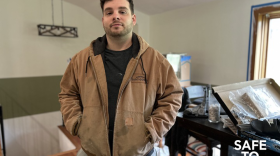Granite Staters using private wells contaminated with PFAS chemicals may soon be able to get a rebate of up to $1,500 to help with installing a treatment system or connecting to an existing public water system.
Residents who had their wells sampled by NHDES will receive a letter or email about the program, and residents who sampled their own wells can reach out to DES by email here to be notified when the program begins accepting applications.
The Department of Environmental Services says applications could open in two to three months.
The program comes in response to “multiple phone calls” on a daily basis from people seeking assistance said Amy Rousseau, DES’s PFAS response administrator.
Almost half of New Hampshire residents get water from a private well, according to DES.
$5 million in funding from the Drinking Water and Groundwater Trust Fund was approved by the New Hampshire Drinking Water and Groundwater Advisory Commission to fund the program, according to Rousseau. That will cover 3,000 wells, she said. The funding must be approved by the legislative fiscal committee, Gov. Chris Sununu and the Executive Council.
PFAS are a group of man-made chemicals that have been widely used since the 1950s. They’re in everything from firefighting foam to non-stick cookware. And they could have harmful health effects for people exposed to them, including reproductive challenges, developmental delays, increased risk of some cancers, and reduced immune system capabilities.
As of early 2022, the Department says it has tested more than 9,000 private wells for PFAS and identified more than 3,500 that exceed one or more of the limits for PFAS chemicals the Department put in place in 2019.
Some private well owners who can trace the source of their contamination to a responsible party have been able to access alternate sources of water. For one area, Saint-Gobain, a company that contaminated private wells with emissions from a Merrimack factory, has provided bottled water or connections to local public water systems after a 2018 consent decree with the state.
But for other private wells, which don’t have an identified party responsible for contaminating their water, the owner is responsible for making the water safe. And DES says 2,000 out of the 3,500 wells found to be contaminated so far could be in that situation.
The counties with the most wells impacted by PFAS exposure that are outside of the area covered by Saint-Gobain’s consent decree are Rockingham, the site of the Pease Tradeport, and Hillsborough, the site of Saint-Gobain’s manufacturing facility.
But Amy Rousseau says 123 communities around the state have wells with exceedances.
“Many people see maybe only a portion of the population in New Hampshire being served by [the rebate]. But that is not the case. This is for any person throughout the state that has a PFAS issue,” she said.
A variety of remediation options are available under the rebate program, and treatment system options range from about $200 to about $6,000, Rousseau said. The cost of a water system connection varies by community.
To be eligible for the rebate, private well owners must test their wells for PFAS or have them tested by the Department. Residents may be able to have New Hampshire DES test their well by signing up here.
Other eligibility requirements for the program can be found on NHDES’s website.








